Juventud Rebelde 221
Harlan Ellison, Dies at Age 94

Harlan Ellison, Writer of Star Trek Series, Dies at 84
The famous science fiction writer died this Thursday in Los Angeles
By Juventud Rebelde
digital@juventudrebelde.cu
A CubaNews translation.
Edited by Walter Lippmann.

Fans and celebrities on social networks mourned the death of the famous writer. Photo: Actualidad RT Published: 29/06/2018 | 10:27 am
Harlan Ellison, a prolific and outstanding writer of novels and short stories specializing in fantasy, horror and, above all, science fiction, died this Thursday in Los Angeles at the age of 84 in his sleep, according to RT.
His publications include over 1700 short stories, novels, scripts, and essays on literature, film, television, and print media. He also worked as an editor and anthologist, especially the anthology Dangerous Visions, paradigmatic of the New Wave movement (a global term for various pop/rock styles from the late 1970s and mid-1980s). Ellison won numerous awards, including several Hugos, Nebulas and Edgars.
Among his most famous stories are The Beast Who Cried Love in the Heart of the Universe, I Have No Mouth and Must Shout, or Repent, Trickster,” said Mr. Tick-tock.
He also starred in numerous incursions into the world of comics and participated in some of his most popular collections such as The Incredible Hulk, Daredevil, Batman and The Avengers.
Photographer Christine Valada spread the news on Twitter at the request of Susan Ellison, wife of the prolific writer, who is known worldwide as the scriptwriter of the 1967 episode of “The City on the Edge of Forever” in “Star Trek” and is considered one of the most wonderful in the series, according to La Vanguardia.
Valada also published Ellison’s farewell phrase, which reads: “For a short time I was here and for a short time I mattered. The author’s literary career includes short stories that were later adapted for cinema as “A Boy and His Dog”.
Series such as “The Man from U.N.C.C.L.E”, “The Starlost” and “The Twilight Zone” also had their mark.
Many fans and celebrities on social networks mourned the writer’s death: “There was no one like him in American literature and there never will be. Angry, funny, eloquent, immensely talented,” said best-selling writer Stephen King.
Chef Anthony Bourdain Dies

Famous international chef Anthony Bourdain dies
After a fruitful career as a chef in various restaurants in New York, Bourdain wrote his memoirs Adventures in the Culinary Belly and began his successful television career.
Published: Friday 08 June 2018 | 11:16:33 AM
By Juventud Rebelde
digital@juventudrebelde.cu
A CubaNews translation.
Edited by Walter Lippmann.

The famous chef was in Havana in 2011 to film a program from the series No Reservations Author: Twitter Published: 08/06/2018 | 11:12 am
PARIS, June 8.- Popular American chef Anthony Bourdain, 61, committed suicide in France on Friday, according to the CNN television network for which he worked.
Bourdain was in France preparing an upcoming program and his friend Eric Ripert, a French chef, found it without knowledge, the source said.
After an intense career as a chef in various restaurants in New York, Bourdain wrote his memoirs Adventures in the Culinary Belly and began his successful television career.
In 2012 he expanded his audience with his new television program Parts Unknown, in which he interviewed then-President Barack Obama. He received the prestigious Peabody Award in 2013.
Bourdain reportedly hanged himself and his body was found in a hotel room in Strasbourg, France.
The famous chef was in Cuba in 2011 to film a chapter of the No Reservations series and then repeated his trip to the island with the Parts Unkown program in September 2015. From the Caribbean nation he showed off the most traditional cuisine, passionate baseball and vintage cars.
It is with extraordinary sadness that we can confirm the death of our friend and colleague Anthony Bourdain, CNN said in a statement, in which it confirmed that the cause of death was suicide.
One of Anthony Bourdain’s most famous phrases is “Your body is not a temple, it is an amusement park”.
We won’t let them destroy our dreams

We won’t let them destroy our dreams.
Statement by Cuban youth in response to the disrespectful and absurd words of U.S. Secretary of State Mike Pompeo at the OAS General Assembly
Posted: Tuesday 05 June 2018 | 09:41:40 PM
By Juventud Rebelde
digital@juventudrebelce.cu
A CubaNews translation.
Edited by Walter Lippmann.
History repeats itself. Arrogance, ignorance of Cuban reality and contempt for the peoples of Our America, lead once again to unacceptable, lying and manipulative statements in the mouth, this time by the U.S. Secretary of State, Mike Pompeo, during the OAS General Assembly, which was well defined by Cuban Foreign Minister Raul Roa Garcia as the United States Ministry of Colonies.
They are wrong again and this character makes a fool of himself when he talks about the lack of opportunities for Cuban youth and questions our rights and options for building the future. This is a gross provocation because, even for someone like him, it would be impossible to ignore the revolutionary conquests that have allowed our children, adolescents and young people to grow and develop showing impressive and irrefutable human development indices, within a society that listens, protects and empowers them.
He speaks of supporting young people and he does so on behalf of the government that is applying a criminal blockade that is widely rejected and condemned by the entire world. It’s the blockade which is responsible for limitations and shortcomings that have a direct impact on the very young people he is now hypocritically trying to defend. He offends with the double standards of those who have given support and refuge to those responsible for terrorist acts that have caused the death and physical incapacity of hundreds of young people throughout the revolutionary process.
We ask ourselves: Why does Mr Pompeo not ask for support for the millions of young people in this region – the most unequal on the planet – who are victims of unemployment, violence, disease, discrimination and extreme poverty?
The Secretary of State cynically advocates the realization of young Cuban talent by pretending that someone believes in his words, when a simple visit to Cuba or a consultation with the statistics of any international organization of education, science and culture would be enough to deny it: Thousands of doctors, hundreds of talented scientists, renowned artists in all their manifestations, champions in sport, teachers of international merit and dozens of other girls and boys of this land destroy the laughable fallacy of Pompeii.
Cuba hurts them. They know that they have not been and will not be able to reverse our history. They have witnessed the magnificent act of sovereignty that constituted the electoral process in our country, as a result of which the new generations have nurtured all levels of government, reaffirming continuity and destroying the dreams of political change that will allow them to once again be the masters of this island.
We are a generation full of motivation. They will never be able to manipulate us, nor put us at the service of imperialism and its lackeys. We are children of mambisa lineage and of a dignity learned from our historical leaders. We are the owners of our streets, those where today we walk in peace and security. We will not allow them to destroy our dreams; all our forces and energies are at the service of the Revolution.
Young Communist League
Dangerous Errands

Dangerous Errands
Package agencies, which do not have official contracts with Cuban companies, are engaged in the illegal trafficking of goods from abroad. For this purpose, they use the route of passengers who accept to bring different products in exchange for payment or compensation. The General Customs of the Republic faces these phenomena with rigor and intelligence
Posted: Wednesday 06 June 2018 | 10:08:01 PM
A CubaNews translation.
Edited by Walter Lippmann.
TRANSLATION: “But officer, I swear I didn’t know this was here!”
To date, 113 cases have been detected of goods traffic sent by 29 illegal parcel delivery agencies from abroad. There have been four reports of smuggling associated with this phenomenon, and more than three tons of products of various types have been confiscated which had tried to enter the country through these networks, the General Customs of the Republic (AGR) reported Wednesday.
Colonel Wiliam Pérez González, deputy chief of the AGR, explained that these are agencies that do not have official contracts with Cuban companies authorized to carry out these operations, and that for this purpose they use the route of encomiendas (internationally prohibited) to passengers, who accept to bring the goods in exchange for payment or compensation.
He added that this action poses a high risk, since sometimes passengers, and often even the same recipient in Cuba, are unaware of the contents of the packages, and when transporting them they may be involved in cases of trafficking in drugs and other illegal materials.
This phenomenon generates the greatest acts of corruption within the AGR, in addition to showing features of organization and impunity, from the networks developed in the country for the commercialization of goods. For all these reasons, he said, the various illegal trafficking networks related to goods are being tackled with rigor and intelligence.
Perez Gonzalez explained that, despite repeated warnings, cases continue to be detected of passengers who, without knowing, carry prohibited items as part of their luggage, thereby incurring violations or crimes punishable under current legislation.
On this subject, in April of this year, a note published on the Customs website (www.aduana.gob.cu) referred to the fact that in the cases discovered, travellers “did not know the contents of the packages”, brought “in exchange for payment made by parcel delivery agencies” dedicated to this activity “without complying with the provisions established in Cuba”, or those of the country of origin.
It also explained that since these are articles sent to third parties by agencies, “their importation acquires a commercial character”, which is prohibited by Cuban customs regulations, and “subject to the administrative sanction of confiscation, if there is no more serious crime”.
At the same time, Customs advised travellers to “refrain from being part of the chain of illegal importation of goods” which unauthorised offices “promote with commercial and enrichment interest” in order to speed up their stay at the border.
Since October 2017, the list of customers with whom the UEB Agencia Aduanal and Transitaria Palco have a parcel and service contract for the shipment of non-commercial cargo of legal trade and origin, as well as the shipping companies with which they have a contractual relationship, has been published on the aforementioned website.
Dear passenger…
What do you need to know about Customs when you arrive in Cuba?
Native-born persons, in their capacity as passengers, are not authorised to carry parcels for other natural or legal persons.
As parcels are understood those goods, packages and packages sent from abroad to third parties using the passenger to transport them.
What risks can be taken with the parcels?
They can be used for the movement and masking of substances and articles used in terrorism, drug trafficking operations and smuggling of goods, which can endanger security, human health and the environment.
The passenger who is the carrier of an order assumes the administrative or criminal responsibility derived from the breach of this regulation.
Some illegal agencies
According to Customs, among the 20 illegal agencies established in the United States are XAEL Habana, Ramiro Miltservice, Va Cuba, Cubamax Travel, Viajes Coppelia, Habana Air, Blue Cuba Travels, Xcellende Travel, Miramar Havana Corp, Rapid Multiservices, Managua Travel, Cubana Service, Caribe Express, Tocororo Travel, Mi Número Local (formerly Cuba Llama) and Central America Cargo.
Notes on shipments
For customs purposes, Shipments shall be understood to be all those received using the services provided by companies and entities expressly authorized for this purpose, either by post or courier, or by using air or sea freight, the latter by air waybill or bill of lading, as appropriate.
Shipments may not contain:
Hidden items to circumvent customs control.
Articles of the same type which, irrespective of their quantity and value, are presumed to be of a commercial nature.
Items whose value, individually or as a whole, exceeds the shipping limit of 200 pesos.
Cash and securities of any kind.
Pornography or other articles that violate morals, good manners or internal order.
Household appliances that are not allowed to be imported.
Equipment requiring prior approval from the Control and Supervision Agency of the Ministry of Informatics and Communications:
Articles of animal or plant origin prohibited by sanitary, phytosanitary and veterinary authorities.
Cuban Customs projections for 2018
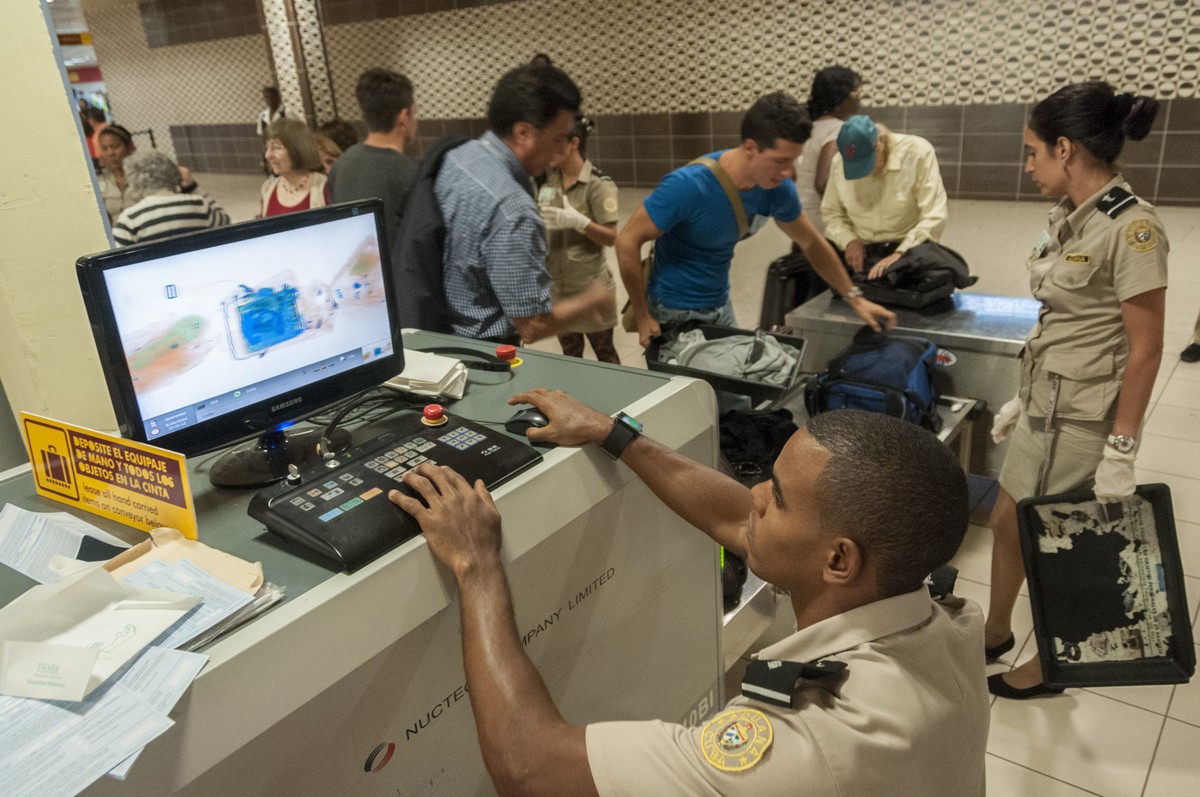
Customs, x-ray and luggage area of Terminal 3 of the José Martí International Airport. Havana. Cuba. PHOTO: Roberto Suárez
Continue to strengthen the system of customs confrontation and improve actions to minimize acts of corruption and crime under a preventive, prophylactic and conscious refusal approach.
Continue to make progress on the technological modernization project to enable the timely detection of acts that threaten national security.
To promote the integral development of the training, qualification, certification and categorization of the forces (Intermediate Technician and Higher Intermediate Technician in Customs).
Continue work on computerization and improvement of customs processes (one-stop shop, authorised economic operators, etc.).
To promote institutional communication actions aimed at the internal and external public.
MDC Meets Jeff Flake and Google President

Diaz-Canel Receives U.S. Senator Jeff Flake and Google President Eric Schmidt
During their meeting, they exchanged views on the status of bilateral relations between Cuba and the United States, as well as possible areas of cooperation of mutual interest.
Posted: Monday 04 June 2018 | 03:03:04 PM
By Juventud Rebelde
digital@juventudrebelde.cu
A CubaNews translation.
Edited by Walter Lippmann.
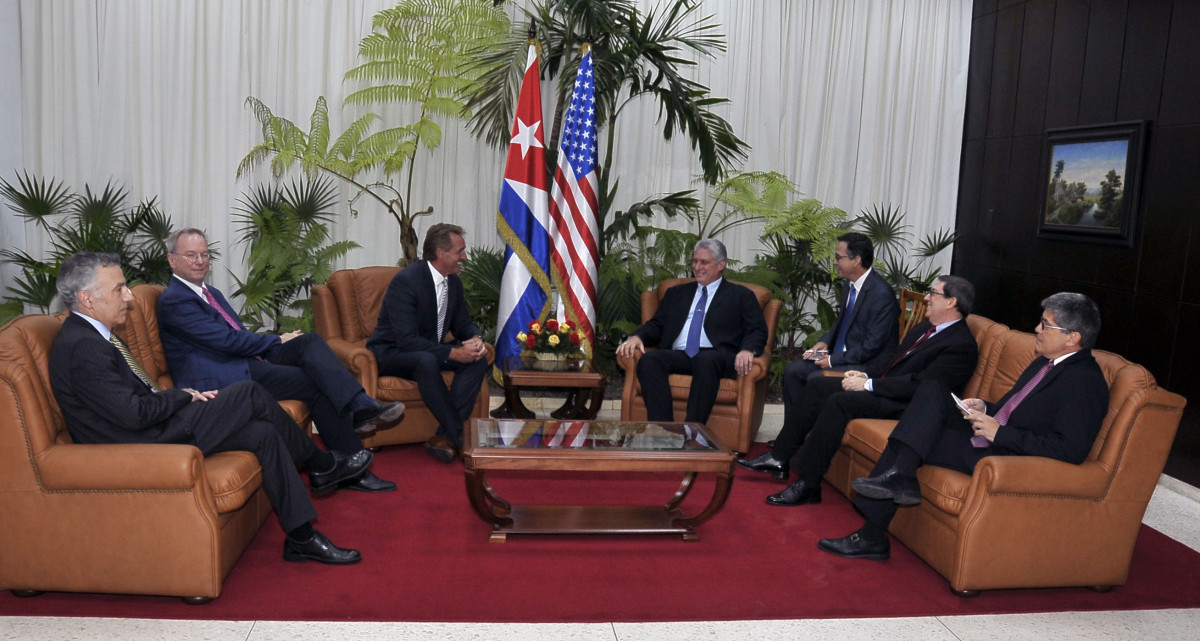
Diaz-Canel received U.S. Senator Jeff Flake and Google President Eric Schmidt Author: Revolution Studies Published: 06/04/2018 | 02:58 pm
President of the Councils of State and Ministers, Miguel Diaz-Canel Bermudez, received Republican Senator Jeff Flake and Google’s Executive President Eric Emerson Schmidt on Monday afternoon. During the meeting, they exchanged views on the status of bilateral relations between Cuba and the United States, as well as possible areas of cooperation of mutual interest. The distinguished visitors were accompanied by the United States Chargé d’affaires in Cuba, His Excellency Philip Goldberg. On the Cuban side, the Minister of Foreign Affairs, Bruno Rodríguez Parrilla, and the United States Director General of the Foreign Ministry, Carlos Fernández de Cossío Domínguez, were present.
Venezuela Will Continue to Resist

Venezuela Will Continue to Resist
 By Lázaro Fariñas
By Lázaro Fariñas
digital@juventudrebelde.cu
A CubaNews translation.
Edited by Walter Lippmann.
With reference to the last elections that took place in Venezuela only a few days ago, we must remember those who said: do what I say, not what I do’. Those who call themselves the international community’ are furious that the Venezuelan government has called a presidential election, carried it out and won it.
Aren’s elections one of the demands made by these so-called constitutional governments of the West? If so, why were they opposed to Venezuela carrying them out? Why did they demand that the opponents boycott them? Afraid they’d go to the polls and lose?
They got it right and came to the conclusion that it would be impossible for them to beat Nicolás Maduro at the polls, so they decided to boycott the electoral process that they themselves had demanded so strongly.
When mobs took to the streets to burn down buildings and some declared that they wanted elections immediately, when part of this fragmented opposition went to the talks in the Dominican Republic, the first demand was also for “elections now”.
It was then that they realized that, if they lost in the elections, they had only two options: to declare that a fraud had occurred or to recognize the legitimacy of the Bolivarian ruler and, therefore, to accept him before public opinion as the legitimate president of the country. Since that is not what they wanted to do, they decided to go down the road of non-participation and denunciation.
First, they left the Mesa de Diálogo and then they began with the international campaign, in which they declared the election call spurious. Then they accused accusing the opposing candidates, who did agree to participate, of playing the Chavistas game. In other words, they saw as illegitimate an action that they themselves had previously demanded from the Bolivarian government.
The votes, according to their criteria, were fraudulent. But how could that be if they hadn’t even been cast? In this they were not even original, as they were copying what Donald Trump had previously stated during his election campaign for the presidency of the United States.
Although perhaps I am exaggerating a little when I say that they were not original, since on second thought, they have said this every time they have participated or not in the marathon electoral processes in Venezuela during the last 20 years. In those leaderships, the opposition won twice and the government acknowledged the results, but when the government won, the word fraud was always used.
The 2013 presidential election, in which Maduro beat Capriles by just over 200,000 votes, by just over one percent, was a cheat for part of the opposition. How was it possible that the government had engaged in fraud and succeeded by such a small margin? Who would think of cheating and getting so small a margin of victory?
On this occasion, as on so many others, the opposition was accompanied by the so-called “international community”. It’s is made up of the United States Government, the governments of the European Union and their loyal followers in Latin America. For example, Brazil, which is governed by the most unpopular president in its history and is also the product, not of the results of elections, but of a parliamentary coup d’état, and Peru, where the president was appointed in the face of the resignation – due to corruption – of the constitutional president.
This misnamed “international community” says it does not recognize the Venezuelan elections and their results. We should ask ourselves what matters to Venezuelans what this group of nations recognizes or does not recognize?
In 2013, opposition candidate Henrique Capriles had no choice but to acknowledge his defeat, but since then, European governments, the United States and other nations have accused Nicolas Maduro of being an illegitimate dictator and have imposed unjust sanctions on him.
The campaign against Venezuela has been intense by the big media allied to the international right, by the colonized opposition, by the parliaments and by the governments of the West. However, the Bolivarian government has resisted. Who says it’s not going to resist now?
The U.S. Has Many Problems

America has a lot of problems, and Trump is targeting others.
Very serious in her assessment, Hillary Clinton said, “Our country is more polarized than ever. We ourselves have classified into opposite camps, and they divide how we see the world.”
Posted: Saturday 26 May 2018 | 09:56:09 PM
 By Juana Carrasco Martin
By Juana Carrasco Martin
juana@juventudrebelde.cu
A CubaNews translation.
Edited by Walter Lippmann.
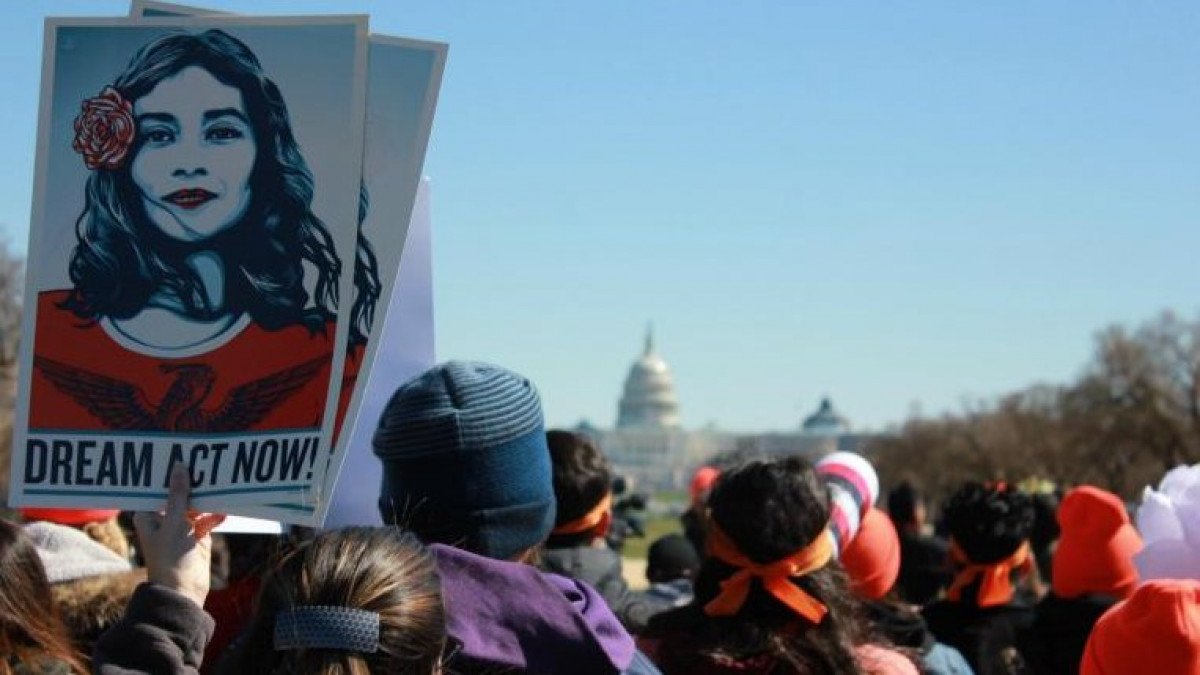
With the suspension of the DACA Plan, many immigrants are at risk of deportation. Author: Flickr Published: 26/05/2018 | 08:00 pm
President Donald Trump did not miss the opportunity and in a message for May 20 – that day when the Republic began in Cuba, mediated by a Platt Amendment that reduced its independence and sovereignty in favor of the United States and its geopolitical and economic interests – he expressed the hackneyed message about a country that claims to suffer under a “tired communist regime.”
So boring that it is not worth paying much attention to the statement on the official White House website.
However, that same Sunday, Hillary Clinton, his failed Democratic challenger, who still thinks and regrets the mistakes she made in the 2016 elections, spoke to the graduates of Yale University – her Alma Mater in law school – and was adamant in judging the situation in her country and the main value that the U.S. leaders have hoisted against Cuba as if we were suffering from it.
“Right now, we are living through a total crisis in our democracy,” the former secretary of state said. “There are no tanks on the streets now, but what is happening right now enters the heart of who we are as a nation. I say this not as a Democrat who lost an election, but as an American afraid of losing her country.”
Very serious in her assessment, Clinton said, “Our country is more polarized than ever. We ourselves have classified into opposing camps, and they divide how we see the world. There are more liberals and conservatives than there used to be and less centrists. Our political parties are more ideologically and geographically consistent…. There are more divisions of race and religion than ever before…”.
Roughly she said: “There are leaders in our country who shamelessly incite with hate speech, who fear change, who see the world in terms of zero-sum, where if some are winning, others must be losing. That’s a recipe for polarization and conflict.
An analysis of the speech at Yale shows that Hillary seemed sadder than angry and – not mentioning Trump at any point, everyone present knew that he was the target of the references – appealed to the trials of other American politicians. But the vision chosen is not flattering; what is more, it falls into the category of a worrying warning.
For example, she chose quotations from a new book by former Secretary of State Madeleine Albright, Fascism: A Warning, and from two titles by Timothy Snyder, professor of history at Yale University: In Tyranny and The Road to Freedom.
As is well known, Trump has attacked certain sectors of the press and accused them of being propagators of false news to the point that the term fake news is already recognised without translation in almost all languages, and the day before, in a tweet, he had described Mrs Clinton as ‘dishonest’.
“To abandon deeds is to abandon freedom. If nothing is true, then no one can criticize power because there is no basis for doing so. If nothing is true, then everything is spectacle,” noted one of the former presidential candidate’s statements. That loudly sounding alarm was considered important by Mrs. Clinton, “because trying to erase the line between fact and fiction, truth and reality is a characteristic basis of authoritarianism.
And she didn’t limit herself to the opinions of Democrats, she also went to Rex Tillerson – who was recently appointed by Trump as Secretary of State – who, in a speech last week to the Virginia Military Institute, said that the United States was “on a path to renouncing our freedom,” if the leaders didn’t speak the truth. With pessimism to be reckoned with, Clinton said, “Maybe a little late, but he’s absolutely right.
And in today’s dissection of the United States, she continued: “There are certain things that are so essential that they must transcend politics,” and “evidence and facts that must alarm us all,” in what he called “waging a war against the rule of law and press freedom, delegitimizing elections, committing shameless corruption, and rejecting the idea that our leaders should be public servants undermines our national unity.
Of course, in the Clinton diatribe, the interests of a party, half-time in an election year lies behind, but the facts are the facts, and Hillary Clinton approached them from macroeconomic and social indicators: “You have learned that you don’t need to be an immigrant and be outraged when the father of a classmate… is unjustly deported” (…) “You don’t need to be a person of color to understand that when black students feel singled out and targeted, there is still work to be done. And you don’t need to experience the violence of a gun…. Enough is enough.
In the United States, children die in school because of the work and grace of an obsessive gun culture, dictated by the profits made by that industry and the politicians who respond to it because it fills their pockets. Trump is not the only culprit, but it is his turn to face it; however, it is far from his vision and interests.
More Americans die in these shootings than in the wars in which the empire is engaged, and no one doubts that life is the greatest of human rights.
A few days ago a black citizen was arrested for his Facebook messages against racist violence, and four students from the group that participated in an anti-gun demonstration in front of the office of Senate Chief Paul Ryan at the Capitol were also arrested, This clearly shows the lack of respect for freedom of expression that the empire’s administrator proclaims and protects its Magna Carta.
Judge Naomi Reice Buchwald, of the Southern District Court of New York, has just said that President Trump’s Twitter account is a public forum and blocking response messages with different opinions constitutes discrimination and violates the First Amendment to the Constitution; but a Justice Department spokesperson replied that they disagree with the court’s decision and is considering steps to be taken that will protect the president.
It was also reported that the National Security Agency (NSA), under the auspices of the Foreign Intelligence Surveillance Act (FISA), recorded more than 530 million phone calls in 2017, a dramatic increase in espionage from 151 million in 2016.
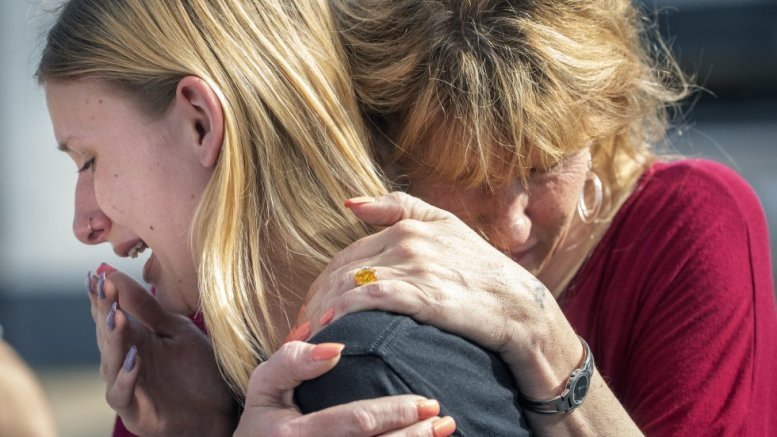
These are just some of the violations of those political and civil rights of American citizens, of the laws that privilege a government and a system of the rich and for the rich. Also, much can be said about the pressures, arm twists, unilateral sanctions, aggressions, wars and military interventions that call into question its self-given role as the perfect state, capable of judging and punishing others, and closing its eyes to its own domestic macro-problems and enormous flaws.
Havana’s 500th Anniversary

Looking Toward Havana’s 500th Anniversary
 By Graziella Pogolotti
By Graziella Pogolotti
digital@juventudrebelde.cu
A CubaNews translation.
Edited by Walter Lippmann.
The information panorama is beginning to show signs of preparations for the forthcoming commemoration of the fifth centenary of the founding of Havana. Many of us were eagerly awaiting this promising announcement, because the passing of time has left scars in a city endowed with unique values and the deterioration of the environment is inevitably reflected in the behaviour of the citizens who live there.
In this context, I think it is right to begin the urgent rescue operation with the restoration of order and cleanliness and to offer concrete answers to the most pressing demands of daily life in the neighborhood. Thus, from the grassroots level, it is possible to appeal to the committed and participatory action of the inhabitants.
The rediscovery of the urban values that have characterozed, through an incessant secular accumulation, the profile that makes the capital unique, cannot be postponed and is no less important. Eusebio Leal’s stubborn preaching has helped to place the heritage legacy forged in colonial times in the place it deserves.
In the remote days of its foundation, Havana was a disorderly agglomeration of adobe and wooden shacks, located next to the port, subject to devastating fires and the threat of the freebooters. With the passage of the fleets and the construction of the defensive system, streets were laid out and houses became larger. The image of the city was configured with its palaces in dialogue with the squares. Moderately baroque, the façade of the cathedral has a space of perfect proportions, open and intimate, like a theatre. After all, the need to preserve urban planning imposed the requirement to delineate regulations through municipal ordinances. Oriented in various directions, the roads, still in use, connected the centre of the city with the surrounding territories.
The expanding city grew westward in successive stages. In search of a more favorable climate, the wealthy built mansions next to the Calzada del Cerro. They would then go to Vedado, Miramar, Cubanacán. In the uninterrupted movement in space and time, stylistic and epochal marks crystallized. They form a treatise on architecture and urbanism, a vocation for modernity tempered by the local context.
The first Industrial Revolution unleashed, in the nineteenth century, the excessive growth of cities. Faced with the danger of a polluting proletarianization, Baron Haussmann made Paris the spectacular scene that we know today. The initial notions of urban design were being established, which has now become a complex transdisciplinary knowledge, aimed at restoring the human dimension to the habitat with the participation of technical knowledge for the management of construction, hydraulic infrastructure networks and waste disposal, adequate road traffic and the social sciences, particularly sociology.
With a modernizing will, Vedado was born presided over by a clear notion of integral urban design. The layout of the main avenues favored rapid communication with the city. Mandatory regulations determined the height limits of the buildings and the lawn area that separated the houses from the sidewalks, conducive to a lifestyle and gave a unique visual characteristic of the area.
In the middle of the last century, financial speculation over land value threatened to subvert the harmonious coherence of the whole. The Revolution was able to preserve its original character for many years, contrary to what happened in other countries where a predatory gigantism destroyed significant historical legacies.
The effects of the economic difficulties, from the special period onwards, partly lacerated the assets we had managed to preserve. Aside from legislation, improvised interventions appeared everywhere. However, in essence, the original imprint of the area remains. We are still in a position to safeguard it if we become aware of its value, because the very rich built heritage of Havana extends beyond the colonial zone. This is how the writers perceived it in some of the best pages of our literature, and it also manifests itself in the latent and underground memory of our popular music.
The approaching half-millennium poses an immense challenge. To assume it wisely and turn it into a collective will is a way of growing. It can’t all be done at once. It will have to be tempered as much as possible, according to the available resources. However, the most important thing, however, is to take into account the imminent while considering the perspective of the future based on the key factors that are unique to the region.
Refuge of Faith and Popular Accompaniment

Refuge of Faith and Popular Accompaniment
Ten married couples who were also pastors of the Church of the Nazarene died in the tragic plane crash last Friday. JR reports on expressions of solidarity and tributes by the peole of Holguin towards their brothers and sisters during these days
Posted: Tuesday 22nd May 2018 | 09:53:08 PM
A CubaNews translation.
Edited by Walter Lippmann.
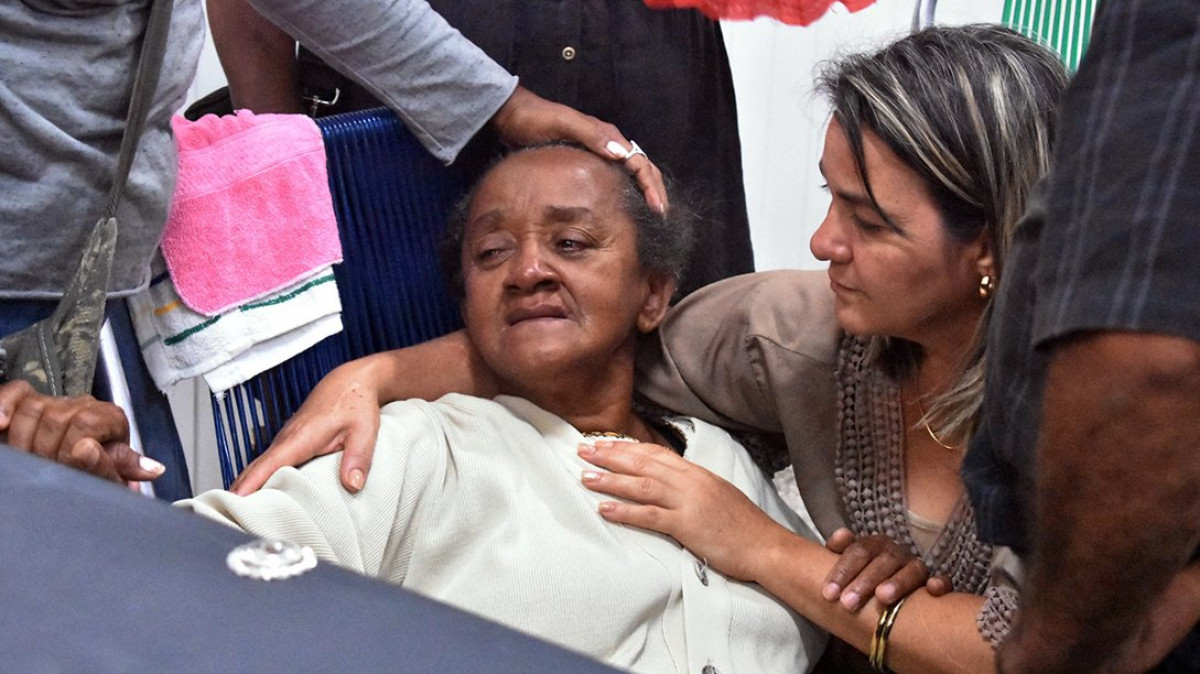
The mother of one of the victims has received comfort from her neighbors, close relatives and siblings of faith Author: Ernesto Herrera Pelegrino Published: 22/05/2018 | 07:10 pm
HOLGUIN: When fatality hovers over a community and takes human lives, the borders between any position, both religious and existential, fade in the face of solidarity and humanism. Everything revolves around the comfort of the mourners, the material and sentimental support they need.
These signs of brotherhood between the human beings were on prominent display during Monday night and Tuesday morning, when the people, in a massive way, joined in the sorrow of the relatives of the two couples of shepherds whose mortal remains returned to their native land, so that their bodies could rest close to their loved ones.
As a posthumous tribute to the work and memory of the marriages of Norma Suárez Niles and Jesús Manuel García Oberto, and Gelover Martín Pérez Avalo and Yoneisi Cordovez Rodríguez, the parishioners of the Church of the Nazarene in this province went to the Los Álamos funeral home and the main hall of the Provincial Art Center, respectively, to accompany their families in sorrow and unite in their faith.
Both places were also visited by co-workers, neighbors, friends and the highest authorities of the Party and the territorial government, as a sign of solidarity over their loss.
Alina Rodriguez Ochoa, an English professor at the University of Medical Sciences and a member of the Church of the Nazarene, was found interpreting for Canadian faith brothers who were on vacation in Havana and who, after learning of the tragedy,decided to travel to Holguin.
She assures us that at this moment her place is at the side of the mourners and she recognizes the dedication of each person in accompanying those who suffer today in their grief.
“Amidst the sadness at the loss of our brothers and friends, we tried to support everything because the district director has been left without his board of directors. My family is supporting the home so that I can be here today. My son is only 15 years old and wanted to stay with the three children of my deceased pastors, my husband is in charge of the home doing the necessary chores and my mother, although she is very old, also helps,” said Alina.
Ruth Collins, from Nova Scotia, Canada, expressed her deepest sorrow at the physical loss of the pastors.
“Our brothers in Canada are praying all the time,” said the member of the Oxford Church of the Nazarene.
The leaders of the congregation also expressed their shock. Luis Ramon Batista Ramirez, superintendent of the work of the Church of the Nazarene in the Cuba-East district (from Ciego de Avila to Maisi), said:
“We are very emotionally affected, not only by our companions and brothers and sisters of faith, but by all those who lost their lives in the accident. This is very painful for the Cuban and international community. I thank God for the collaboration that has come from churches, neighbors, friends…. all always supporting.
As a result of the death of the married couple, ten children under the age of 16 were orphaned. The Superintendent expressed the responsibility that the Church assumes with these children in its decision to “never abandon them, to keep them in our lap, we will always help them. Although we will not be able to replace their parents, we will do everything we can to help them in their education, so that they may continue to know God and do everything possible for them until they become men and women.
Meanwhile, Héctor Rafael Ortiz Hidalgo, a priest of the Church and member of the Ministerial Studies Board, remembered his deceased brothers as “unblemished people, of faith, with conviction; people in whom both the church and the neighbors had enormous confidence.
The priest also acknowledged the help of the Government of the province, “which has been unconditional” and stressed: “The Church-Government relationship has been tremendous: they have provided us with cars, supplies, all the facilities to do the work that we have carried out during these four days, with doctors and psychologists. The Church of the Nazarene is very grateful to you.
In this hour of grief, it is very difficult for family members to agree to give statements to the press. Nevertheless, Milagro Suárez Niles, sister of Norma Suárez Niles, overcame the feeling that overwhelms her to thank all those who, in different ways, in numerous spaces and at different levels, have shown themselves sensitive to her loss:
“We have felt the solidarity from the Council of State, in the figure of President Miguel Díaz-Canel; from the Church at the national level, from the comrades in the Government… Everyone has been very attentive. Unfortunately we don’t have the being we want next door. Therefore, I recognize the company of the brethren of religion, because they have prayed that we may have calm. Everybody sees me and hugs me, kisses me. I am left with the satisfaction that my sister was happy the days before the accident, sharing and celebrating with her colleagues. That gives me strength in the midst of the pain that will never happen,” said Milagro.
According to Ernesto Herrera Pelegrino, who has been very close to the congregation during these days for professional reasons, there have been many expressions of support for the relatives and homage to the victims in many communities in the territory.
“The shepherds who worked in the Estrada neighbourhood (Urbano Noris) were among the dead. There the people spontaneously made a book of condolences, brought flowers to the church and formed a kind of reminder. Many people joined the parishioners in their grief to remember those pastors who made an impact with their example and dedication. In the community of La Calera, near Velasco, a funeral service was held for one of the shepherds who died. In the midst of the pain, these expressions have been very beautiful as a gesture of solidarity,” said the young journalist.
These are signs of sensitivity and humanism of a people who, diverse in their religious positions and thoughts, unite in the face of pain, “in a tight context”, as the Teacher [Jose Marti] taught us.
Closed

Closed
Posted: Saturday 19th May 2018 | 09:21:59 PM
 By Graziella Pogolotti
By Graziella Pogolotti
digital@juventudrebelde.cu
A CubaNews translation.
Edited by Walter Lippmann.
Here and there, in private commercial establishments, the use of English advertisements is spreading, as if by blast wave. This presence begins to invade public space. In these circumstances, it is essential to remember that Spanish is the official language in our country. Identity bearer, an essential component of our culture, it integrates the constitutive factors of the sovereign nation. Moreover, the law imposes a requirement that all citizens must use it it.
One might suppose that there is a temptation among new traders to please visitors from other countries who are increasingly coming to us, even though not all of them are native English speakers.
This is an erroneous assessment. The motivations of travelers are manifold. Many enjoy the attractions of nature, the sun and the beach. Others prefer to frequent the cities, interested in the heritage values that make them unique and in the behaviour of a communicative, streetwise, welcoming and friendly people, as those who have spent time with us since colonial times have recognised. In the built environment and in the people who inhabit it, they discover the values of a different culture, built up through a specific history.
Unconsciously, the environment around us influences the use of language. I was a young graduate looking for a job when I was offered the opportunity to collaborate on the development of a spelling manual. The author of the text had previously conducted a survey among students to detect the most frequent errors. There were not when writing the word beer, despite the c, v and z, so committed in our Latin American speech. At that time, the competition between the most recognized brands was manifested in an advertising display in the streets and on television. The spelling was indelibly engraved on everyone’s retina.
According to the press, the President of the Councils of State and Ministers, Miguel Díaz-Canel, stressed in words spoken by the Ministry of Education, the need to attach the importance it deserves to the development of reading habits through the conduct of a teacher, who must always carry a book before the schoolchildren who must follow his example.
The issue becomes more important in times of increasing dominance of audiovisual communication. It has been the subject of international analysis and research. Among us, the issue demands first-rate attention in view of the deterioration in the use of the language, which is of concern to a wide range of social sectors. In various ways, there has been a need to give due weight to language learning, not only through the use of grammar, but also through training in the comprehension of literary texts.
The mastery of the language associated with human communication and the ability to forge in the students the exercise of independent, critical and creative thinking, open to access to knowledge and to the permanent search for innovation, is a fundamental demand of this era. It constitutes an inseparable part, together with history and mathematics, of the triad of disciplines which, beyond the instrumental, are distinguished by their formative character.
Preserving the potential richness and expressiveness of the word and designing strategies based on the present and, above all, with a view to the future of the creatures that are being born, when the dominant telegraphic messages in the use of mobile phones supplant the art of conversation, block productive dialogue, interfere with the transmission of knowledge, castrate the creative impulse of imagination and limit the sensitive approach between humans, are urgent demands.
The complexity of the challenge involves the family and the school, but transcends compartmentalized institutional boundaries. Since dawn, communication has presided over the entirety of our existence, just as much as the oxygen we breathe. It manifests itself in the most intimate part of the home, in the streets, in the provision of services, in the formulas of civilized coexistence, in the fabric of the information networks that connect us with the reality of the country and with the paths of international events. Understanding the magnitude of the problem is an essential step in the search for solutions.
Culture and identity embrace the territory of spirituality, the residence of the values that define us as a people. They last and are transmitted through the language we have inherited. Let us take care of it in the messages that animate our streets, in the media, at school and in the workplace. We can do it right now. In the meantime, to be precise
Subscribe to Blog via Email
| M | T | W | T | F | S | S |
|---|---|---|---|---|---|---|
| 1 | ||||||
| 2 | 3 | 4 | 5 | 6 | 7 | 8 |
| 9 | 10 | 11 | 12 | 13 | 14 | 15 |
| 16 | 17 | 18 | 19 | 20 | 21 | 22 |
| 23 | 24 | 25 | 26 | 27 | 28 | |

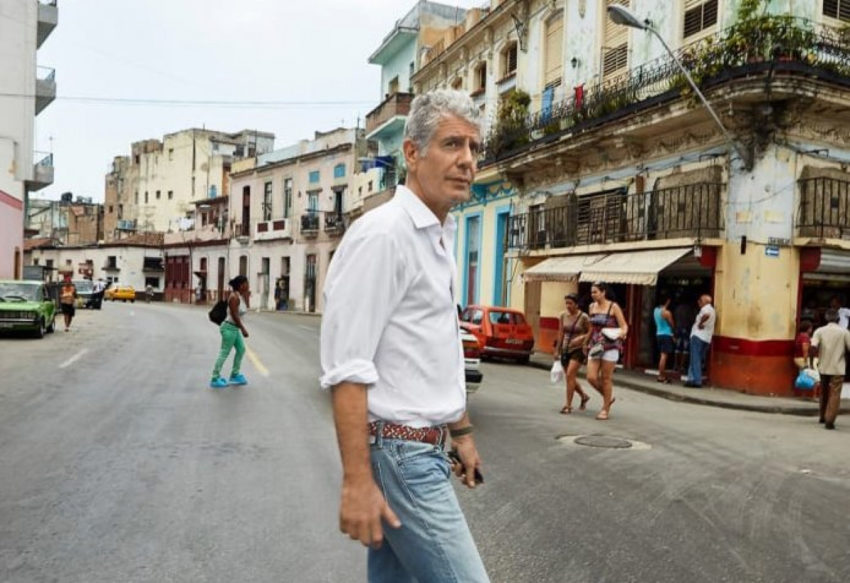
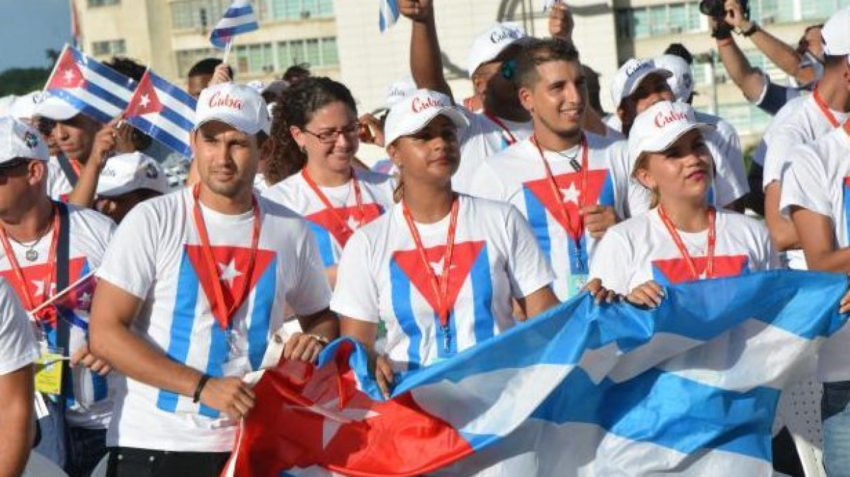
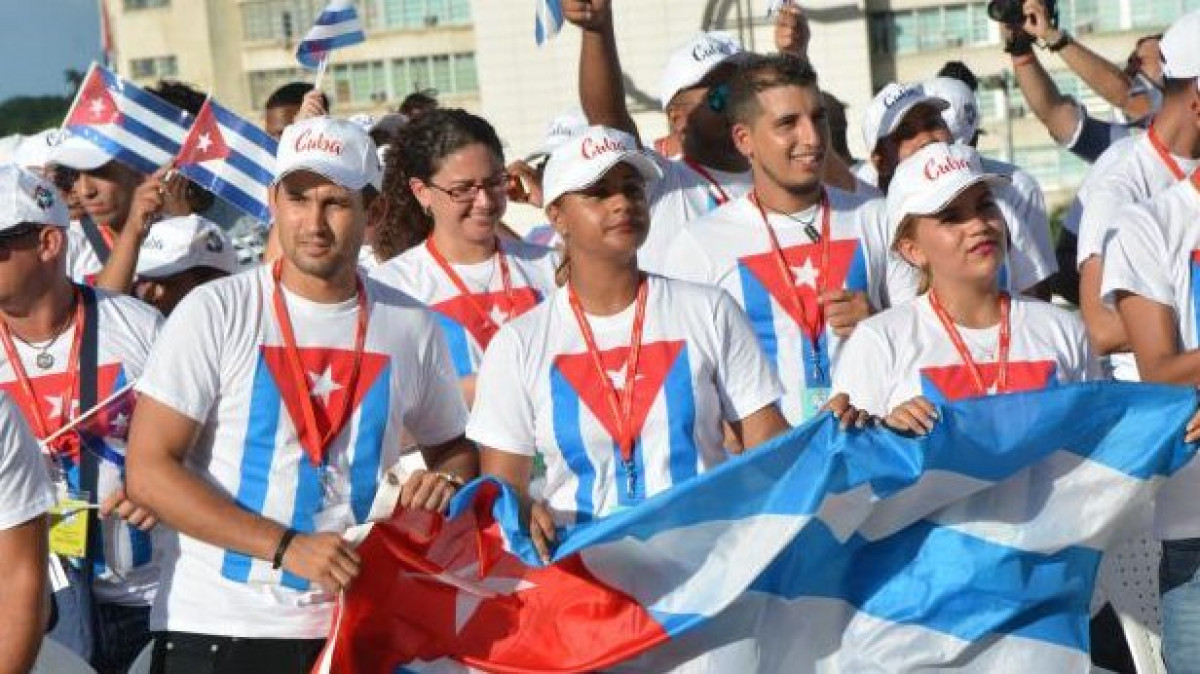
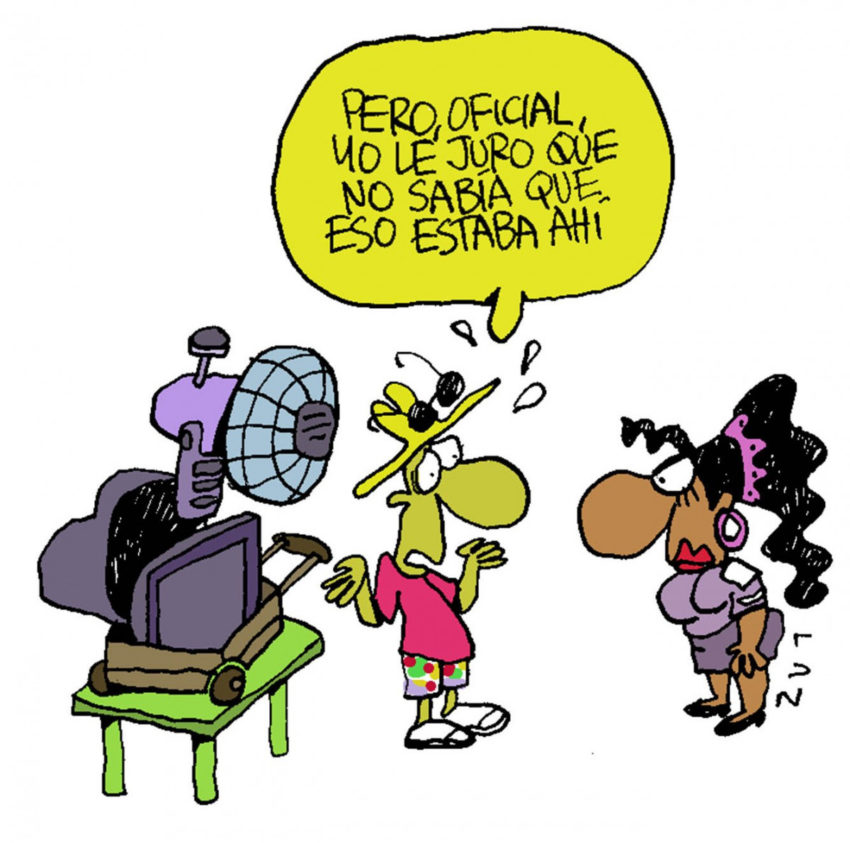

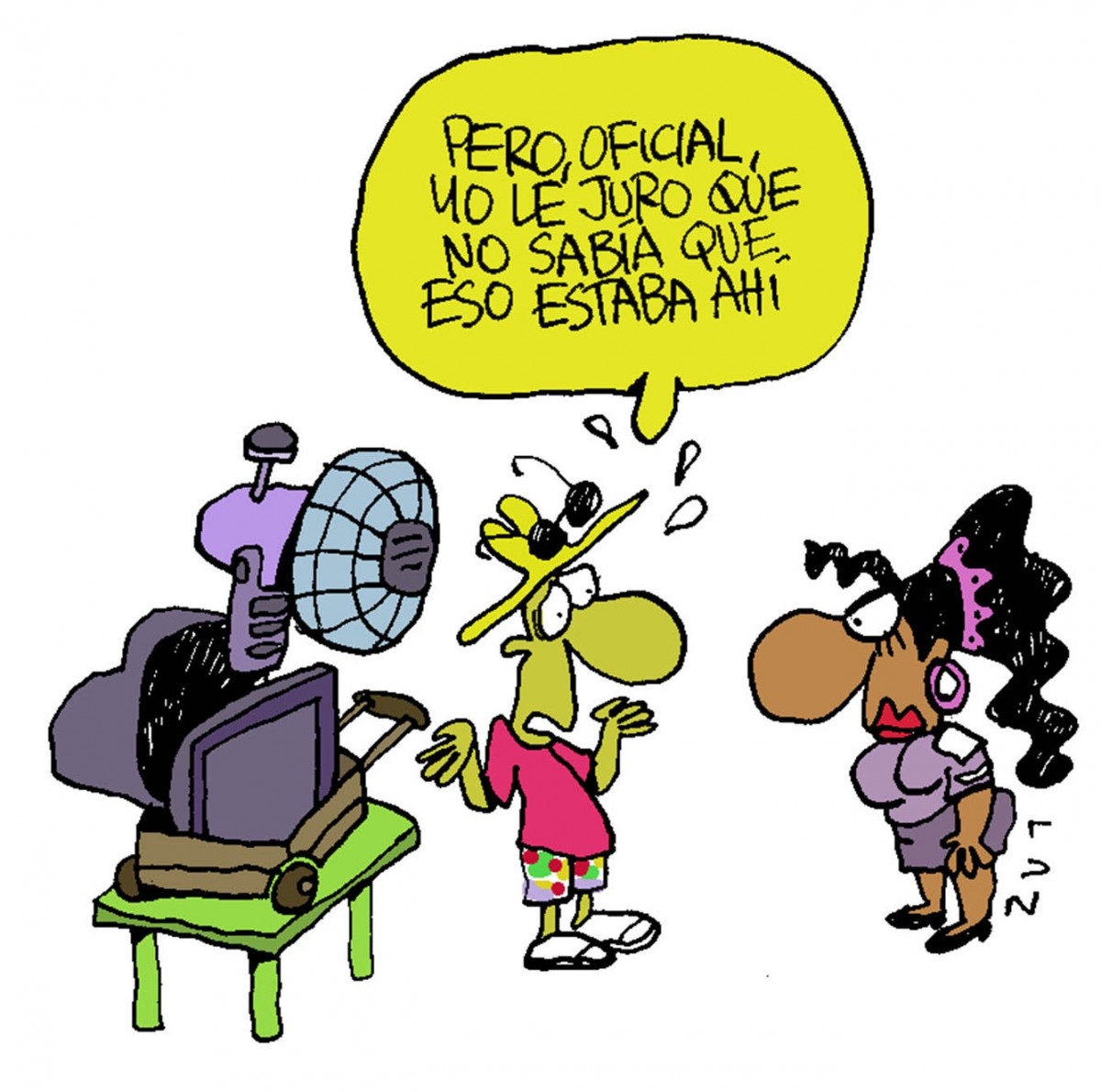
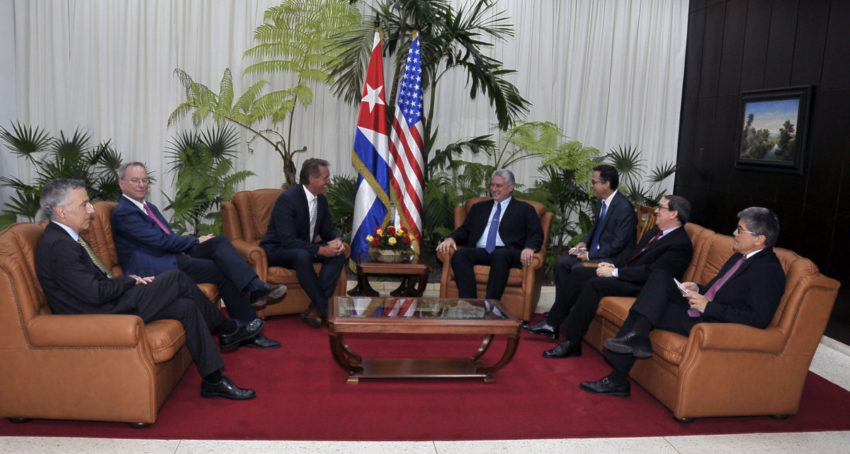
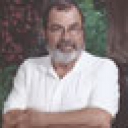
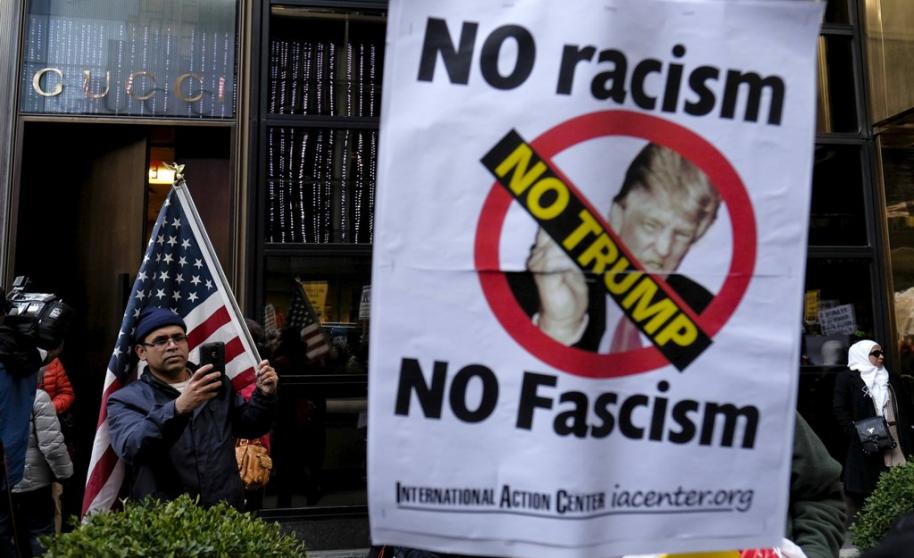
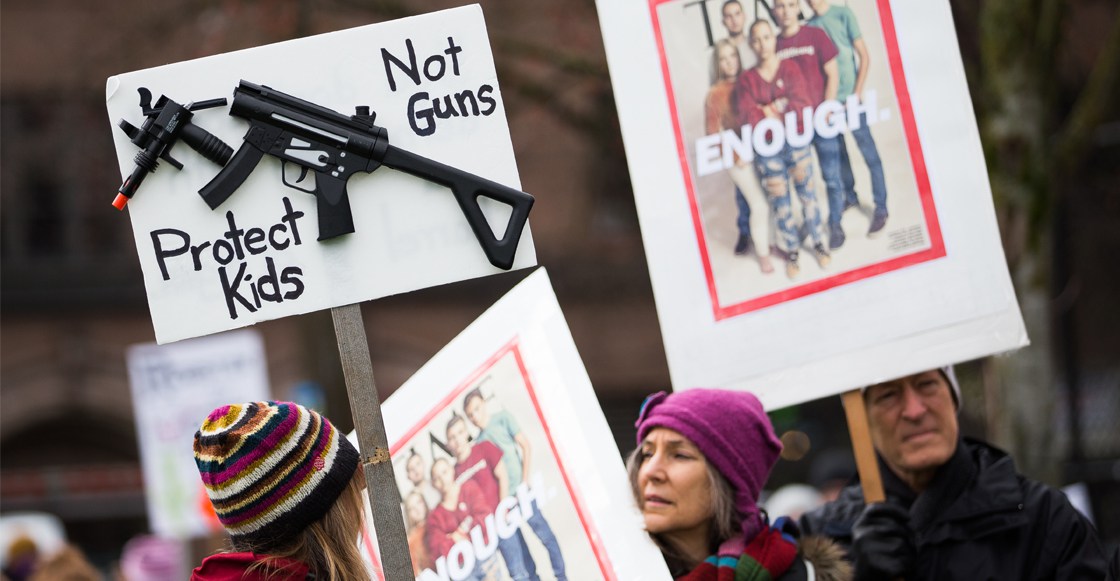
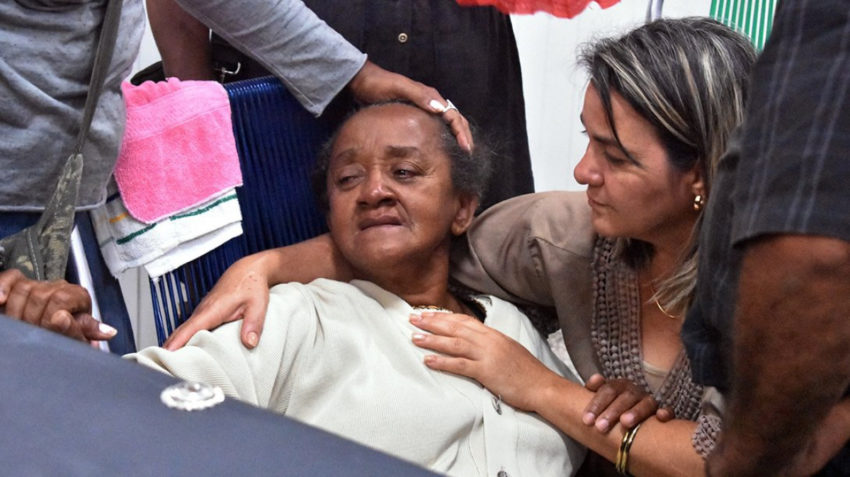

You must be logged in to post a comment.